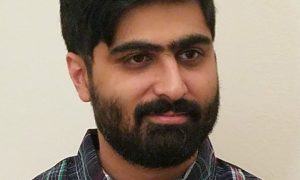Ben Tarnoff in The Guardian:
 A boy speaks one language at home and another at school. The white kids want to know where he is from. The answer is “here”, same as them, but that’s not what they’re asking. After 9/11 they call him Osama. His parents are from Pakistan. When he visits Karachi, his relatives point out his US accent. He lives between two worlds, belonging to neither. Then, in the sixth grade, something happens. He is doing a science project on Isaac Newton. He visits the public library of the small town in Pennsylvania where he lives, and, browsing books about Newton the scientist he comes across another Newton – Huey P Newton, cofounder of the Black Panther Party. In 1973, Newton published an autobiography called Revolutionary Suicide. Intrigued by the title, the boy picks up the book, and it changes his life.
A boy speaks one language at home and another at school. The white kids want to know where he is from. The answer is “here”, same as them, but that’s not what they’re asking. After 9/11 they call him Osama. His parents are from Pakistan. When he visits Karachi, his relatives point out his US accent. He lives between two worlds, belonging to neither. Then, in the sixth grade, something happens. He is doing a science project on Isaac Newton. He visits the public library of the small town in Pennsylvania where he lives, and, browsing books about Newton the scientist he comes across another Newton – Huey P Newton, cofounder of the Black Panther Party. In 1973, Newton published an autobiography called Revolutionary Suicide. Intrigued by the title, the boy picks up the book, and it changes his life.
This is the scene that opens Mistaken Identity: Race and Class in the Age of Trump. It’s vividly drawn, and sets the stakes for what follows. Asad Haider has written a book about identity, politics, and the relationship between the two. In particular, he has written a book about “identity politics”, a phrase that, like “political correctness”, is extremely slippery, but which generally means an emphasis on issues of racial, gender and sexual identity. Identity politics finds critics everywhere. Throw a rock at a rack of newspapers and you’ll probably hit an editorial condemning it. Conservatives such as Republican House speaker Paul Ryan blame it for polarisation, while liberals like the Columbia University historian Mark Lilla hold it responsible for Donald Trump’s victory, applying the baroque logic that letting people use their preferred gender pronouns is why Democrats struggle to be seen as the party of working people.
More here.
